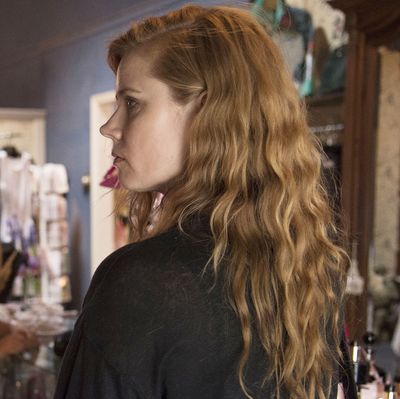
The first episode of Sharp Objects is beautifully confident. It moves between different timelines in a way that’s moody and meaningful, its performances are persuasive and mysterious, and the atmosphere is somehow both otherworldly and absolutely real.
But also, I couldn’t hear all of the dialogue.
I’ll admit that this is a cranky, cantankerous objection, and it’s also a massive self-own. (“I love this show but I can’t hear anything they say!” the ancient, belligerent woman yelled online.) It’s an even bigger self-own for someone who may have, perhaps, complained about TV being (literally) too dark. But the dialogue on Sharp Objects is occasionally so inaudible that it’s a very real distraction from an otherwise gorgeous show. It’s time to talk about this problem!
It happens in important expositional moments, like the phone conversation between Camille (Amy Adams) and her editor, Frank Curry (Miguel Sandoval), when she explains what she’s learned about the murders in Wind Gap. It happens in vital character-development scenes, including Camille’s conversations with her mother Adora (Patricia Clarkson), whose eerily whispered enunciation loses some of its unnerving gothic impact when you can’t actually understand what she’s saying. It happens in big revelatory moments, like the scene when Camille and Amma (Eliza Scanlen) finally talk to one another about their family and we get some clues about Camille’s deceased sister Marian (Lulu Wilson). Amma asks if Marian was “perfect,” and Camille tells her she wasn’t, but she was close. It’s a creepy scene, and it feels very significant for Amma and Camille’s relationship. But I had to watch it three times to make sure I heard what they actually said.
If quiet dialogue were just a problem for Sharp Objects, this would be a small-scale grievance. But in its general disregard for audibility — in its commitment to a range of volumes that prioritize slammed car doors and vodka glugs above spoken words — Sharp Objects feels like one of an increasingly noticeable cohort. The Americans, a notorious too-dark offender, also had its frustratingly too-quiet moments. (What a relief to get a bit all in Russian, since you knew at least there’d be subtitles!) It’s a frequent problem on The Handmaid’s Tale, where the whispered exchanges that characters hide from their oppressors also result in them hiding their words from us. It’s a problem on Dietland, Mr. Robot, Fargo, Seven Seconds, Ozark, and Mindhunter. It’s even a problem on Westworld, where you’d think very quiet dialogue would be an unnecessary addition to its purposely befuddling elements.
Can I fix this problem by turning on subtitles? Sure. (I hate to do it for a show like Sharp Objects, though, where the beautiful, off-kilter rhythms can be hampered by seeing a line of dialogue a bit too early.) Can I just turn up the volume louder? Sure! But I was astonished to find that in a press screening of the first episode, in a large theater setting with amply loud speakers, the dialogue was even more muddy, even harder to distinguish from the show’s enveloping soundscape of fragmentary music, rustling foliage, and creaky doors.
Why is this happening? Is whispered dialogue a new stand-in for how we know a TV show is Serious and Important? (If it is, for once it’s a signifier that doesn’t feel particularly gendered — I am weirdly comforted to have strained to hear dialogue from men and women alike.) Is there an increasing gulf between the way producers check the final mixes of their shows and the ways many people actually watch them on laptops and phones with cheap earbuds? When this issue recently generated thousands of complaints to the BBC, one of the implications was that directors weren’t prioritizing audibility. Perhaps there’s an industry-wide culture that overemphasizes visuals at the expense of sound?
Of course, whispered scenes do serve a purpose. Barely audible dialogue can feel raw, genuine, and tonally useful in the right moments. It forces a viewer’s attention to be wholly in the story, because if you’re not paying attention, you’ll definitely miss some mumbled revelation. It’s also a form of realism: In real life, car doors are louder than someone muttering a sly deprecation, and sometimes you miss the words other people say.
But the point of a TV show is that it’s not real life. Actors are portraying characters, giving us access to stories we don’t experience in our everyday lives. Directors make stories more beautiful, more suspenseful, more moody and funny and dramatic. Sharp Objects is a southern gothic drama, a genre that works by taking a place, a home, a town, and heightening the sense of discomfort and darkness to sharpen our perception of the uncanny. It can feel incredibly real on an emotional level, and it can feel true in a way that the real world often doesn’t. Being inaudible is not necessary to create that mood, though. It just makes it very, very hard to hear. The magic would not be ruined if people spoke up just a hair.





